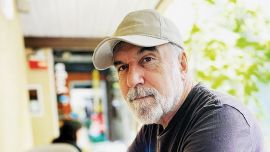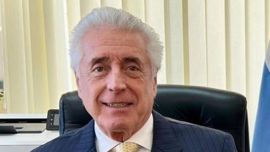Those who have lived in isolation for years in Patagonian localities do not fear solitude – but they are afraid of the coronavirus pandemic devastating a local economy dependent on tourism and oil.
Near the Andes they have suffered major blizzards which have left them without power and incommunicado for months, while on the shores of the Atlantic Ocean they have been hit by merciless rains blocking all access routes.
Those in Patagonia are accustomed to isolation and having only one hospital for miles around, but they are suffering the ravages of the pandemic in a region of Argentina which, according to the analysts, will be badly hit due its dependence on tourism and oil, two of the sectors most affected by the Covid-19 crisis.
ASTRID PERKINS
Bahía Bustamante, in the oil province of Chubut, is on the northern shore of the gulf of San Jorge on the Atlantic Ocean. It is a zone rich in biodiversity with an intensely blue sea and white sandy beaches with large rock formations.
There, on a farm, “completely self-sufficient” and in the middle of nowhere, Astrid Perkins lives alone with her husband, completely isolated.
“The closest city is 180 kilometres away,” informs Astrid, referring to Comodoro Rivadavia with over 230,000 inhabitants, which officials have declared to be in a sanitary emergency.
“Over a fortnight ago we blocked off the entrance to the farm completely. We maintain communication with the outside world via radio and WiFi, which we keep going for some hours with solar energy”.
“Life goes on here as usual but we are very much more geared to producing food for various months between the sea and the biodynamic orchard.”
“We consider ourselves fortunate to be quarantined in such spacious premises so full of resources and as beautiful as this. I can do a 360-degree turn and wherever I look is pure nature, I don’t need anything more.”
Astrid and her husband have already passed through other periods of isolation when in previous years intense rainfall transformed the access routes into veritable rivers.
Nevertheless, the pandemic leaves her very “uncertain, very worried “ about the economy, which is steeped in a deep and seemingly endless recession.
This province “is broke, there is a serious sanitary crisis,” she nods.
Here “there are sheep ranches and the wool market went down the tubes, we do some tourism and that closed shop,” she relates.
“The economic problem was already immense and now we have this.”
MARTÍN DÍAZ
Martín Díaz has been living in El Chaltén since 1985, when the town was founded.
Located in the province of Santa Cruz in the southern Andes, this town is one of the youngest in Patagonia.
Díaz was born on a nearby farm and is a key figure for this town of 1,400 inhabitants, which is repeatedly recommended in tourist guides as one of the best places to visit in Argentina.
With sights like the imposing Mount FitzRoy, the place lives off tourism. Díaz himself owns two hostels.
“This year we had everything reserved but it was all cancelled due to this virus,” he laments.
SILVIA ROJAS
Silvia Rojas, 58, was born in Buenos Aires City, but at the age of 47 she was looking for a radical change of lifestyle and moved together with her husband to Mallín Ahogado, a rural zone of some 4,000 inhabitants scatted over 30,000 hectares in the extreme southwest of Río Negro Province.
The closest shopping centre is El Bolsón, a city of 19,000 wedged in a valley surrounded by the Andes mountains 20 kilometres away.
“The isolation [order] did not affect our everyday life. No big changes, we go into town once a week and buy things for ourselves and the neighbours,” she explains. “The fact of living in isolation obliges us to organise among [ourselves among] neighbours.”
Silvia loves the vast, unlimited spaces, nature at its purest, framed by the mountain range with its rivers, lakes and virgin forests. But she has had to undergo several situations of total isolation due to the intense blizzards lashing the zone in recent winters.
“We had no electricity, completely cut off.” Patagonia has become accustomed to living on little and “working things out with what there is.”
Nevertheless, this isolation is “emotionally different.” Her three children and her mother of 90 are still in Buenos Aires, also in isolation.
related news
by MARIA LORENTE, AFP

























Comments